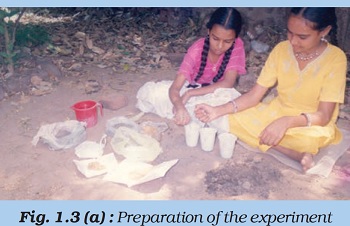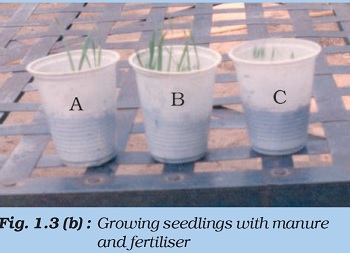1.5 Adding Manure and Fertilisers
NCERT Class 8 Science Textbook for Blind Students made Screen Readable by Dr T K Bansal.
The substances which are added to the soil in the form of nutrients for the healthy growth of plants are called manure and fertilisers.
I saw a healthy crop growing in a farm. In the neighbouring farm, the plants were weak. Why do some plants grow better than others?
Soil supplies minerals and nutrients to the crop plants. These nutrients are essential for the growth of plants. In certain areas, farmers grow crop after crop in the same field. The field is never left uncultivated or fallow. Imagine what happens to the nutrients?
Continuous cultivation of crops makes the soil poor in nutrients. Therefore, farmers have to add manure to the fields to replenish the soil with nutrients. This process is called manuring. Improper or insufficient manuring results in weak plants.
Manure is an organic substance obtained from the decomposition of plant or animal wastes. Farmers dump plant and animal waste in pits at open places and allow it to decompose. The decomposition is caused by some microorganisms. The decomposed matter is used as organic manure. You have already learnt about vermicomposting in Class 6.
Activity 1.2
Take moong or gram seeds and germinate them. Select three equal-sized seedlings. Take three empty glasses or similar vessels. Mark them A, B and C. To glass A add a little amount of soil mixed with a little cow dung manure. In glass, B put the same amount of soil mixed with a little urea. Take the same amount of soil in glass C without adding anything [Figure 1.3(a)]. Now pour the same amount of water in each glass and plant the seedlings in them. Keep them in a safe place and water them daily. After 7 to 10 days observe their growth [Figure 1.3(b)].
Figure 1.3 (a) : Preparation of the experiment

Figure 1.3 (b) : Growing seedlings with manure and fertiliser.

Did plants in all the glasses grow at the same pace? Which glass showed better growth of plants? In which glass was the growth fastest?
Fertilisers are chemicals which are rich in a particular nutrient.
How are they different from manure?
Fertilisers are produced in factories. Some examples of fertilisers are;
urea,
ammonium sulphate,
super phosphate,
potash,
NPK (Nitrogen, Phosphorus, Potassium).
The use of fertilisers has helped farmers to get better yield of crops such as wheat, paddy and maize. But excessive use of fertilisers has made the soil less fertile. Fertilisers have also become a source of water pollution. Therefore, in order to maintain the fertility of the soil, we have to substitute fertilisers with organic manure or leave the field uncultivated (fallow) in between two crops.
The use of manure improves soil texture as well as its water retaining capacity. It replenishes the soil with nutrients.
Another method of replenishing the soil with nutrients is through crop rotation. This can be done by growing different crops alternately. Earlier, farmers in northern India used to grow legumes as fodder in one season and wheat in the next season. This helped in the replenishment of the soil with nitrogen. Farmers are being encouraged to adopt this practice.
In the previous classes, you have learnt about Rhizobium bacteria. These are present in the nodules of roots of leguminous plants. They fix atmospheric nitrogen.
Table 1.1 : Differences between Fertiliser and Manure
| S.No. | Fertiliser | Manure |
|---|---|---|
| 1. | Fertiliser is a man-made inorganic salt. | Manure is a natural substance obtained by the decomposition of cattle dung and plant residues |
| 2. | Fertiliser is prepared in factories. | Manure can be prepared in the fields. |
| 3. | Fertiliser does not provide any humus to the soil. | Manure provides a lot of humus to the soil. |
| 4. | Fertilisers are very rich in plant nutrients like nitrogen, phosphorus and potassium. | Manure is relatively less rich in plant nutrients like nitrogen, phosphorus and potassium. |
Table 1.1 gives the differences between a fertiliser and manure.
Advantages of Manure :
The organic manure is considered better than fertilisers. This is because
- it enhances the water holding capacity of the soil.
- it makes the soil porous due to which exchange of gases becomes easy.
- it increases the number of friendly microbes.
- it improves the texture of the soil.
